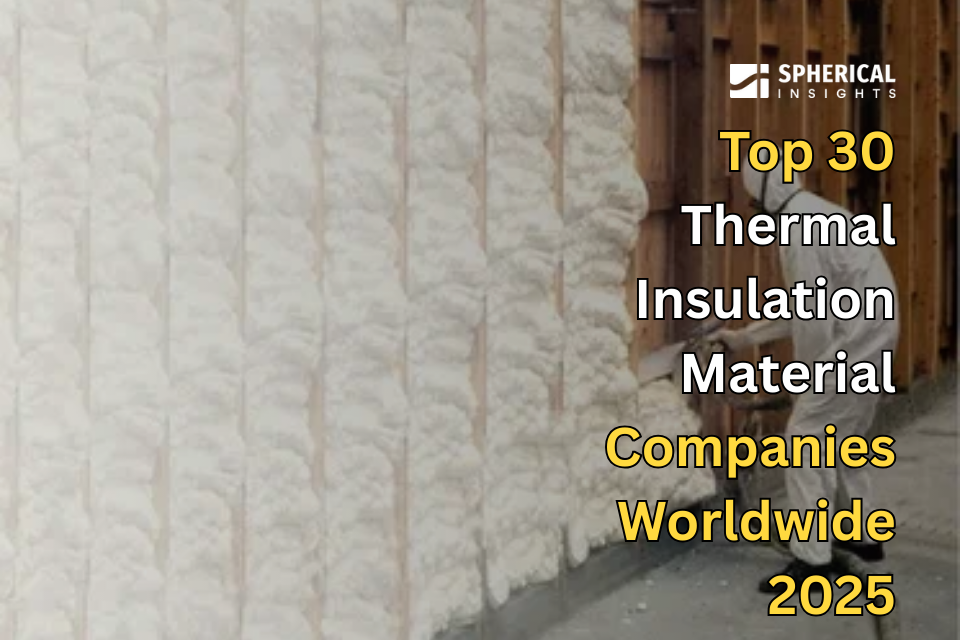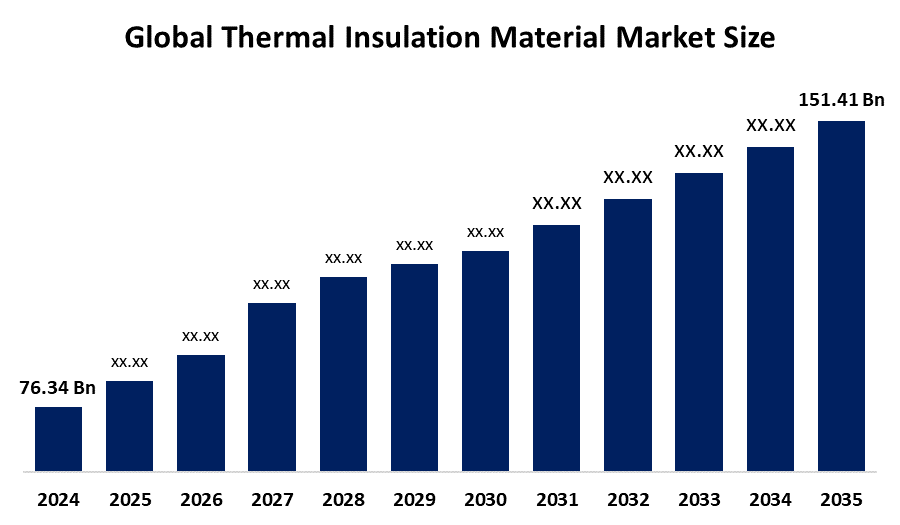
Top 30 Thermal Insulation Material Companies Worldwide 2025: Statistical View by Spherical Insights & Consulting
RELEASE DATE: Aug 2025 Author: Spherical InsightsRequest Free Sample Speak to Analyst
Description
According to a research report published by Spherical Insights & Consulting, The Global Thermal Insulation Material Market Size is projected to Grow from USD 76.34 Billion in 2024 to USD 151.41 Billion by 2035, at a CAGR of 6.42% during the forecast period 2025–2035. The United Kingdom Thermal Insulation Material Market is growing with increased demand for energy efficiency, particularly in the construction and automotive industries, and rising government regulations and awareness of environmentally friendly materials.
Introduction
The thermal insulation material market refers to products that help minimize heat transfer across surfaces, insulate target temperatures in residential, commercial, and industrial uses. These products, including fiberglass, mineral wool, polyurethane foam, and aerogels, have extensive uses in building, heating, ventilation, and air conditioning systems, automotive, and manufacturing industries to enhance energy efficiency and minimize environmental footprint. Market expansion is spurred by increasing energy prices, increased adoption of green building technology, and strict building codes requiring energy conservation. The market drivers are a broad range of applications, ongoing innovations in material science, and growing demand in the emerging economies. Opportunities are in increasing Asia Pacific urbanization, green building fad, and emerging technology providing light, sustainable insulation. Government schemes such as energy efficiency incentives, building retrofit schemes, and low-carbon building codes have also played a big role in increasing adoption. As industries prioritize sustainability and energy conservation, Japan Thermal Insulation Material Market is also possible to experience sustainable growth in the coming years, driven by both environmental imperatives and policy regulation.
Navigate Future Markets with Confidence: Insights from Spherical Insights LLP
The insights presented in this blog are derived from comprehensive market research conducted by Spherical Insights LLP, a trusted advisory partner to leading global enterprises. Backed by in-depth data analysis, expert forecasting, and industry-specific intelligence, our reports empower decision-makers to identify strategic growth opportunities in fast-evolving sectors. Clients seeking detailed market segmentation, competitive landscapes, regional outlooks, and future investment trends will find immense value in the full report. By leveraging our research, businesses can make informed decisions, gain a competitive edge, and stay ahead in the transition toward sustainable and profitable solutions.
Unlock exclusive market insights - Download the Brochure now and dive deeper into the future of the Thermal Insulation Material Market.
Thermal Insulation Material Market Size & Statistics
- The Market Size for Thermal Insulation Material Was Estimated to be worth USD 76.34 Billion in 2024.
- The Market Size is Going to Expand at a CAGR of 6.42% between 2025 and 2035.
- The Global Thermal Insulation Material Market Size is anticipated to reach USD 151.41 Billion by 2035.
- Asia Pacific is expected to generate the largest demand during the forecast period in the Thermal Insulation Material Market
- North America is expected to grow the fastest during the forecast period in the Thermal Insulation Material Market.

Regional growth and demand
North America is expected to grow the fastest during the forecast period in the thermal insulation material market. The North America region is a rapidly expanding market for thermal insulation materials, supported by fast developing infrastructure, growing industries, such as construction, oil and gas, automobile, and aerospace, and increased consumer focus on efficient products, supported by strict building regulations and government incentives.
Asia Pacific is expected to generate the largest demand during the forecast period in the thermal insulation material market. Asia Pacific leads the thermal insulation material market due to rapid urbanization, growing construction and industrial economies, increasing per-capita incomes, and strong government investment in efficient infrastructure and green building initiatives.
Top 10 trends in the Thermal Insulation Material Market
- Smart insulation solutions
- Retrofitting demand
- Bio-based insulation materials
- Nanotechnology integration
- Advanced light mineral wool
- Rising adoption of plastic foams
- Hydrogel-based smart windows
- Advancements in insulation materials
- Growth in the industrial sector
- Focus on sustainability and circular economy
1. Smart insulation solutions
Smart insulation technologies are transforming thermal insulation with adaptive materials and systems that adjust according to changes in the environment. These technologies optimize energy efficiency, minimize carbon emissions, and improve building comfort. Some of the major trends involve phase-change materials, aerogels, and IoT-based systems that ensure optimal insulation performance according to real-time requirements.
2. Retrofitting demand
The increasing need for retrofitting in existing buildings propels thermal insulation materials. The trend focuses on improving energy efficiency, lowering emissions, and complying with more stringent building codes. Retrofitting tends to add advanced insulation solutions to optimize thermal performance with minimal structural modification, encouraging sustainability and cost reductions.
3. Bio-based insulation materials
Bio-based insulation materials are increasing in demand as sustainable substitutes for conventional options. Produced using renewable materials such as hemp, wool, and cellulose, they have good thermal performance with minimal environmental footprint. This trend promotes green building practices, minimizes carbon emissions, and addresses increasing green customer and regulatory pressures.
4. Nanotechnology integration
Integration of nanotechnology is revolutionizing thermal insulation with improved properties at the microscale. Nanomaterials such as nano-coatings and aerogels provide increased thermal resistance, lower thickness, and lighter weight. This development fuels innovation in efficient building with possibilities for compact, high-performance insulation solutions in contemporary, sustainable buildings and infrastructure.
5. Advanced light mineral wool
Advanced light mineral wool is a new trend in thermal insulation, providing improved energy efficiency with lighter weight and easier installation. The added thermal and acoustic performance of this product makes it the perfect solution for contemporary construction. This innovation is compatible with green building practices without compromising on fire resistance and durability performance.
Empower your strategic planning:
Stay informed with the latest industry insights and market trends to identify new opportunities and drive growth in the thermal insulation material market. To explore more in-depth trends, insights, and forecasts, please refer to our detailed report.
Leading 15 Companies in the Global Thermal Insulation Materials Market
- BASF SE
- Kingspan Group PLC
- Huntsman International LLC
- Johns Manville Corporation
- Owens Corning Corporation
- Atlas Roofing Corporation
- Rockwool International A/S
- Armacell International S.A.
- Saint-Gobain S.A.
- GAF Materials Corporation
- 3M Company
- Cabot Corporation
- Roxul Inc.
- Byucksan Corporation
- Guardian Building Products Inc.
1. BASF SE
Headquarters: Ludwigshafen, Germany
BASF SE is a global leader in innovative and sustainable insulation solutions. The company’s flagship products, Neopor and Styrodur, represent advanced expandable polystyrene (EPS) and extruded polystyrene (XPS) materials widely used in building insulation. These solutions deliver excellent thermal resistance, durability, and moisture protection. Leveraging nanotechnology, BASF enhances insulation efficiency and supports sustainable construction practices. Its products contribute significantly to green building standards, reduced energy consumption, and carbon footprint reduction in the construction sector.
2. Kingspan Group PLC
Headquarters: Kingscourt, Ireland
Kingspan Group PLC is a global pioneer in high-performance insulation and building envelope solutions. Its product portfolio includes rigid insulation boards, insulated panels, and cutting-edge systems such as Kooltherm and Therma boards, known for their superior thermal resistance, durability, and moisture management. Kingspan places strong emphasis on sustainable innovation, aligning with carbon-neutral construction goals. With applications spanning residential, commercial, and industrial sectors, Kingspan’s solutions enhance energy efficiency and ensure superior indoor comfort across global markets.
3. Huntsman International LLC
Headquarters: The Woodlands, Texas, USA
Huntsman International LLC is a key provider of advanced insulation materials, specializing in polyurethane (PU) and polyisocyanurate (PIR) systems. These are widely applied in building insulation, refrigeration, and industrial applications. Huntsman’s spray foam and rigid foam products are valued for their high thermal resistance, lightweight properties, and long service life, offering significant energy savings. Focused on innovation and sustainability, Huntsman ensures its insulation systems comply with stringent building codes while contributing to reduced energy consumption and greenhouse gas emissions.
4. Johns Manville Corporation
Headquarters: Denver, Colorado, USA
Johns Manville Corporation is a leading global supplier of comprehensive insulation solutions serving residential, commercial, industrial, HVAC, and OEM markets. Its product range includes fiberglass batts and rolls, mineral wool, spray foam, rigid foam boards, calcium silicate, duct and pipe insulation, and polyisocyanurate boards. These materials deliver superior thermal resistance, sound control, fire protection, and moisture management. With a strong focus on innovation and sustainability, Johns Manville enhances building performance, energy efficiency, and occupant comfort worldwide.
5. Owens Corning Corporation
Headquarters: Toledo, Ohio, USA
Owens Corning Corporation is a prominent manufacturer of thermal insulation products, particularly fiberglass-based solutions for residential, commercial, and industrial markets. Its product lineup includes batts, rolls, and loose-fill insulation, recognized for their high thermal resistance, fire safety, and sound absorption capabilities. Owens Corning emphasizes sustainability and energy efficiency, producing environmentally friendly insulation solutions that contribute to reduced energy usage and lower greenhouse gas emissions. Its innovations support global efforts toward greener, more efficient buildings.
Are you ready to discover more about the thermal insulation material market?
The report provides an in-depth analysis of the leading companies operating in the global thermal insulation material market. It includes a comparative assessment based on their product portfolios, business overviews, geographical footprint, strategic initiatives, market segment share, and SWOT analysis. Each company is profiled using a standardized format that includes:
Company Profiles
- BASF SE
- Business Overview
- Company Snapshot
- Products Overview
- Company Market Share Analysis
- Company Coverage Portfolio
- Financial Analysis
- Recent Developments
- Merger and Acquisitions
- SWOT Analysis
- Kingspan Group PLC
- Huntsman International LLC
- Johns Manville Corporation
- Owens Corning Corporation
- Atlas Roofing Corporation
- Rockwool International A/S
- Armacell International S.A.
- Saint Gobain S.A.
- Others.
Conclusion
The thermal insulation materials market is experiencing strong growth, fueled by rising energy costs, stricter building regulations, and global sustainability goals. Key industry trends include the adoption of smart insulation technologies, retrofitting solutions, bio-based materials, nanotechnology advancements, and the rising use of light mineral wool. Leading players such as BASF, Kingspan, Huntsman, Johns Manville, and Owens Corning are delivering advanced, energy-efficient solutions for diverse applications. In addition, government incentives and the expansion of green building initiatives are accelerating demand, supporting long-term growth focused on reduced environmental impact and enhanced energy efficiency across industries.
Need help to buy this report?